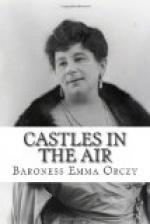I was to take all the risks, remember!—New Caledonia, the police, the odium attached to so foul a deed; and do you know for what? For a paltry thousand francs, which with much difficulty I had induced Rochez—nay, forced him!—to hand over to me in anticipation of what I was about to accomplish for his sake. A thousand francs! Did this miserliness not characterize the man? Was it to such a scrubby knave that I, at risk of my life and of my honour, would hand over that jewel amongst women, that pearl above price?—a lady with a personal fortune amounting to two hundred thousand francs?
No, Sir; I would not! Then and there I vowed that I would not! Mine were to be all the risks; then mine should be the reward! What Rochez meant to do, that I could too, and with far greater reason. The lovely Leah did at times frown on Fernand; but she invariably smiled on me. She would fall into my arms far more readily than into his, and papa Goldberg would be equally forced to give his consent to her marriage with me as with that self-seeking carpet-knight whom he abhorred.
Needless to say, I kept my own counsel, and did not speak of my project even to Sarah. To all appearances I was to be the mere tool in this affair, the unfortunate cat employed to snatch the roast chestnuts out of the fire for the gratification of a mealy-mouthed monkey.
3.
The appointed day and hour were at hand. Fernand Rochez had engaged a barouche which was to take him and his lovely victim to a little house at Auteuil, which he had rented for the purpose. There the lovers were to lie perdu until such time as papa Goldberg had relented and the marriage could be duly solemnized in the synagogue of the Rue des Halles. Sarah had offered in the meanwhile to do all that in her power lay to soften the old man’s heart and to bring about the happy conclusion of the romantic adventure.
For the latter we had chosen the night of May 23rd. It was a moonless night, and the Passage Corneille, from whence I was to operate, was most usefully dark. Sarah Goldberg had, according to convention, left the postern gate on the latch, and at ten o’clock precisely I made my way up the cul-de-sac and cautiously turned the handle of the door. I confess that my heart beat somewhat uncomfortably in my bosom.
I had left Rochez and his barouche in the Rue des Pipots, about a hundred metres from the angle of the Passage Corneille, and it was along those hundred metres of a not altogether unfrequented street that he expected me presently to carry a possibly screaming and struggling burden in the very teeth of a gendarmerie always on the look-out for exciting captures.
No, Sir; that was not to be! And it was with a resolute if beating heart that I presently felt the postern gate yielding to the pressure of my hand. The neighbouring church clock of St. Sulpice had just finished striking ten. I pushed open the gate and tip-toed across the threshold.




